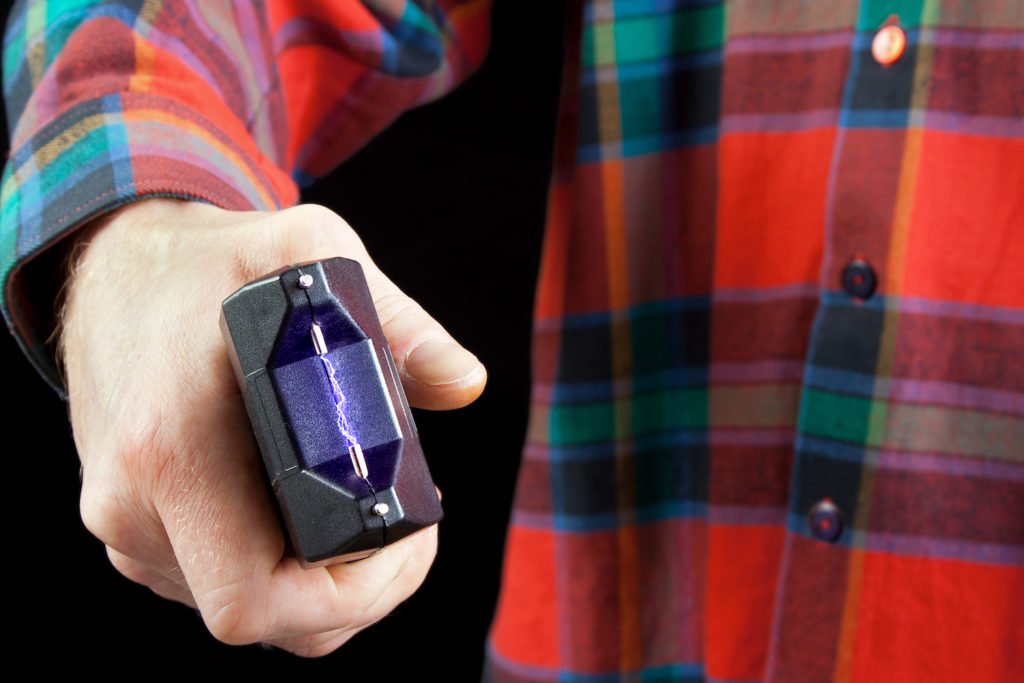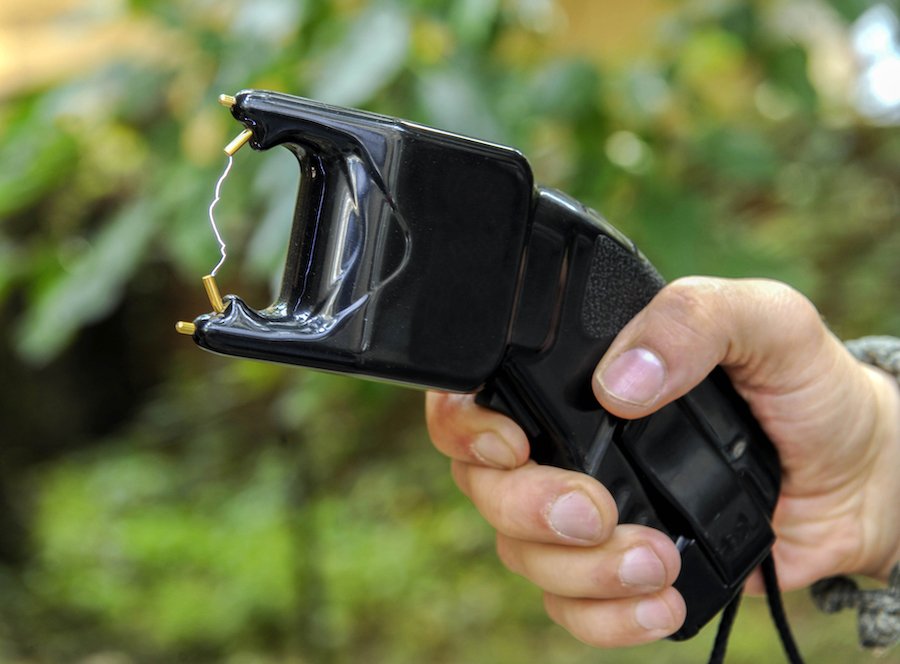In Colorado, adults who are not felons are generally allowed to possess, carry, buy or sell stun guns to use in lawful self-defense. Therefore, stun guns cannot be used as a toy or to break the law.
CRS 18-12-106.5 makes it a class 5 felony to knowingly and unlawfully use a stun gun in the commission of a crime – whether or not it gets discharged.
In this article, our Denver Colorado criminal defense attorneys discuss:
- 1. Are stun guns legal in Colorado?
- 2. What is the penalty for using a stun gun in a crime?
- 3. How do I defend against stun gun charges?
- 4. Can I get the case sealed?
- Additional Reading
1. Are stun guns legal in Colorado?
Yes. The possession, purchase, and selling of stun guns are legal under Colorado state law. However, using a stun gun against someone is only permitted if it is necessary to protect yourself or others from an immediate physical threat of harm.
However, it is a crime to use a stun gun in the commission of a criminal offense, even low-level misdemeanor crimes. It does not matter if anyone gets shocked by the stun gun.3
Example: James holds up a cashier by pointing a stun gun at her. Here, James faces criminal charges for both robbery as well as using a stun gun in the commission of the robbery.
It is irrelevant that James never discharged the stun gun or whether the cashier was scared by the stun gun. James’ act of using the stun gun as a way to carry out the robbery qualifies as a CRS 18-12-106.5 violation.

Stun guns include stun belts, electric shock prods, and stun guns that are compact and portable.
What is a stun gun?
Colorado law defines a stun gun as “a device capable of temporarily immobilizing a person by the infliction of an electrical charge.”2 It does not qualify as a
- “dangerous weapon”,
- “deadly weapon,” or
- “illegal weapon.”3
Stun guns are also known as stun belts, shock prods, or portable stun guns.
Tasers, like stun guns, are legal in Colorado. Unlike stun guns, which are close-range devices, tasers operate by shooting darts with an electrical charge (“long-range shock weapons”).
Can I buy a stun gun without a background check?
Yes. Background checks are not required to purchase stun guns. You do not need a special license to have a stun gun.
Do I need a permit to carry a concealed stun gun?
No. Unlike concealed handguns, the concealed carry of stun guns is usually legal without a CCW (carrying concealed weapons) permit.
Local governments may have their own local laws regulating weapons and concealed carry laws. However, Colorado state law takes precedence over (“preempts”) conflicting local ordinances unless the local laws involve firearms.4
Whenever you travel with stun guns, always look up the local law to educate yourself about the rules.
Can felons possess stun guns?
No. Convicted felons may not knowingly possess weapons such as stun guns in Colorado. Felons found with a stun gun face charges for possession of a weapon by a previous offender (CRS 18-12-108) – abbreviated POWPO.
POWPO is usually a class 6 felony, punishable by
- 1 to 1 ½ years in Colorado State Prison (with 1-year mandatory parole), and/or
- A fine of $1,000 to $100,000.5
Can minors have stun guns?
No. Colorado stun gun laws prohibit kids younger than 18 years of age from possessing stun guns. Police may ask stun gun carriers to show proof of their age.6
2. What is the penalty for using a stun gun in a crime?
As a class 5 felony, unlawful use of a stun gun in Colorado is punishable by:
- 1 to 3 years in prison (with 2 years mandatory parole), and/or
- A fine of $1,000 to$100,000.7
This sentence is in addition to the penalties for the underlying criminal offense(s) you were allegedly using the stun gun for, such as:
- aggravated assault (first-degree assault (CRS 18-3-202) or second-degree assault (CRS 18-3-203)),
- aggravated robbery (CRS 18-4-302), or
- menacing (CRS 18-3-206).
Furthermore, the penalties for these underlying offenses may increase because you used the stun gun.
3. How do I defend against stun gun charges?
Using a stun gun is illegal in Colorado only if you use it to commit a criminal offense. Therefore, the best defense to Colorado stun gun charges is to prove you did not commit the underlying crime — known as the “predicate offense.”
Seven common defenses to CRS 18-12-106.5 charges include (but are not limited to):
- The device used did not meet the definition of a stun gun.
- You did not use the stun gun in any way to carry out the underlying crime.
- You were acting in legal self-defense or defense of someone else.
- The stun gun was inadmissible evidence because it was discovered from an illegal search and seizure in violation of your Fourth Amendment rights.
- The police officers coerced a confession during the investigation.
- Law enforcement lacked probable cause to make an arrest.
- There were other procedural errors peace officers made such as when detaining or questioning suspects.
Note that claiming self-defense is an affirmative defense. This means that you admit to using the stun gun, but that the use was justified. The burden then falls on the prosecution to show that you were not acting in reasonable self-defense.8
Typical evidence in these cases includes video surveillance footage, cellphone recordings, eyewitness testimony, expert testimony, and/or forensic evidence.

A conviction for violating CRS 18-12-106.5 can be sealed 3 years after the case ends.
4. Can I get the case sealed?
If you are convicted of using a stun gun to carry out a crime in Colorado, you may get your charge sealed from your record three years after the case ends. You can petition the court for a record seal if the charge gets dismissed.9
Learn how to seal Colorado criminal records.
Additional Reading
For more in-depth information, refer to these scholarly articles:
- Towards a socio-technical understanding of discretion: a case study of Taser and police use of force – Policing and Society.
- Stunning Trends in Shocking Crimes: A Comprehensive Analysis of Taser Weapons – Journal of Law and Health.
- The Shocking Truth: Law Enforcement’s Use and Abuse of Tasers and the Need for Reform – Villanova Law Review.
- Shocking the Conscience: What Police Tasers and Weapon Technology Reveal about Excessive Force Law – UCLA Law Review.
- Excessive force, civil liability, and the Taser in the nation’s courts: Implications for law enforcement policy and practice – Policing: An International Journal.
Legal References:
- CRS 18-12-106.5; People v. Wheeler, App. (2007), 170 P.3d 817; People v. Bass, (Colo. App. 2006) 155 P.3d 547.
- Colorado Revised Statute 18-12-101 subsection (1)(i.5).
- CRS 18-12-102; CRS 18-1-901.
- See, for example, Eagle County Code 9.12.130 (carrying concealed stun guns is a class A municipal offense). Also see Milliken Code 10-9-10; Parker Code 5-06-190; Minturn Code 10-12-40; Milliken Code 18-9-40; Thornton Code 38-239; and Pueblo Code 11-1-601 0. See also Colorado Senate Bill 256 (2021).
- CRS 18-12-108.
- See, for example, the stun gun superstore checkout (“When purchasing from this website you represent that you are age 18 or over and will only use the product(s) in a lawful manner for self-defense and/or law enforcement.”).
- CRS 18-12-106.5.
- Roberts v. People (2017) 2017 CO 76, 399 P.3d 702.
- CRS 24-72-701-708.
